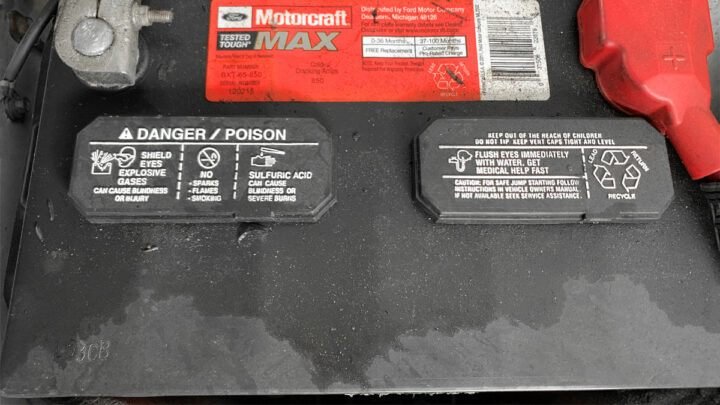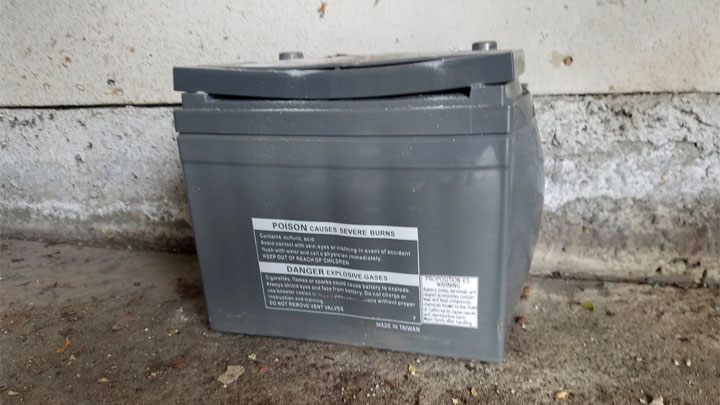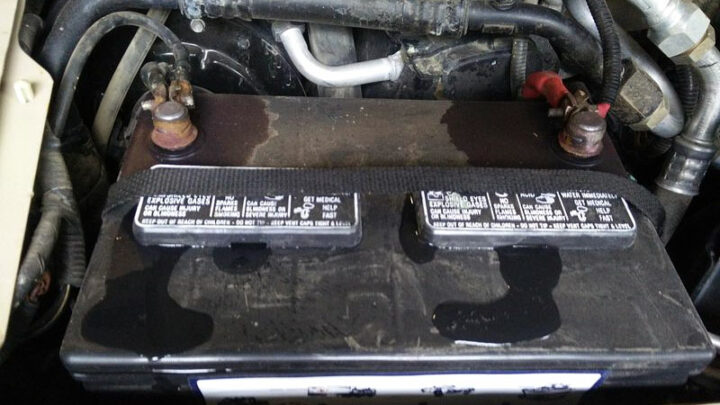Is Your Car Battery Leaking? (Here’s What To Do)
The typical automotive battery plays a far more important role than most realize and regular inspections are a must. But what if you notice the battery has a leak or visual loss of electrolyte?
Naturally, there will be concern if you notice your car battery leaking. But what caused it and more importantly, what should you do if you notice a leaking battery?

Recognizing the Signs of a Leaking Battery
There are several key signs worth keeping an eye out for that suggest your vehicle’s battery is leaking. Recognizing these symptoms is extremely important when attempting to address the issue of a leaking battery in a timely manner.
The following are several of the most common signs of a leaking automotive battery.
#1 – Odd Odors
A battery, when leaking, often exudes an odd, if not unpleasant odor, which comes courtesy of the battery acid itself. This odor is most often associated with the smell of rotten eggs.
#2 – Corrosive Build-up
A leaking battery will often exhibit signs of corrosive build-up, especially around its terminals. This build-up will appear chalky and is often blue/green in color.
#3 – Battery Sweating
In many instances, a leaking battery will seemingly sweat, appearing damp in nature. This dampness might appear to come and go or be more pronounced at certain times, and under certain conditions.
#4 – Case Distortion

When a battery begins to leak, and gasses vent in an abnormal manner, the unit’s structural case often begins to distort. This distortion can appear as swelling, bulging, or bowing.
See Also: Common Symptoms of a Bad Car Battery
Causes of Car Battery Leaks
Battery leaks can be caused by one of several different underlying conditions, each of which warrants explanation. In some cases, understanding these potential causes can prevent such instances of untimely battery failure moving forward.
The following are several of the most common causes of automotive battery leaks.
- Overcharging
- Wreck-damage
- Exposure to extreme temperatures
- Vibration from lack of securement
- Lead-plate sulfation
- Old age
What To Do
In general, an automotive battery leak can be categorized in one of two different manners; minor or severe.
Batteries with only a minor leak, often around their terminals, can be carefully cleaned and monitored closely going forward.
Cleaning of this minor electrolyte seepage can be accomplished by applying a light amount of baking soda and water to the affected area, before gently wiping away all residue. While doing so, the correct PPE (chemical-resistant glove, safety glasses, etc.) should be worn.
If a moderate to severe battery leak is discovered, the battery in question should be properly discarded. Before removing this battery, a liberal amount of baking soda and water should be applied to neutralize sulfuric acid boil-over.
The battery should then be removed, and taken to a qualified battery disposal agent. All remnants of previous spilled battery acid should then be cleaned, before a new battery is installed.
How Dangerous is a Car Battery Leak?

A leaking automotive battery presents a hazard that must be addressed and dealt with in a timely manner, no matter the situation. The liquid contained within most automotive batteries is known as sulfuric acid.
This chemical is quite potent and is known for its inherent toxicity and corrosive characteristics. Prolonged exposure to sulfuric acid fumes can lead to respiratory issues, while direct contact can lead to severe chemical burns.
Additionally, automotive batteries also contain lead plates which react with the sulfuric acid mentioned above. Because of this, those who become exposed to sulfuric acid, are also almost always exposed to a certain degree of lead as well. Lead has been identified as a key irritant to the kidneys and nervous system.
FAQs
Is It Safe to Drive?
While it is generally safe to drive with a battery that is leaking only a miniscule amount of acid around its terminals, you should never continue driving with a battery that is leaking at a significant rate.
As a general rule, if acid leakage is severe enough that you can watch it occur with the naked eye, the battery in question should be discarded immediately.
Can a Leaking Car Battery Explode?
Though rare, yes, it’s possible for a leaking car battery to explode. A couple instances can be found here and here. This can occur due to overcharging, which causes the electrolyte solution inside the battery to boil.
The build-up of hydrogen gas, mixed with air, can create a highly combustible environment that can trigger an explosion if there’s an ignition source, like a spark.
What Fluid is Leaking Out?
When a car owner states that their “battery is leaking,” they are simply implying that sulfuric acid is leaking externally, from their battery’s case.
Sulfuric acid is contained within virtually every automotive battery, where it serves as a reactionary medium with a battery’s lead plates. This is also where the term “lead-acid battery” originates.
What If I Accidentally Touch the Contents That Are Leaking?
If you accidentally touch the acid which has leaked from an automotive battery, you should remove yourself to a location with running water, as soon as possible.
Your should thoroughly rinse your hands, or any other affected areas with cool water for a period of several minutes. Where available, baking soda can also be used as a neutralizing agent, when attempting to prevent acid burns.
What’s That Smell?
The smell that often accompanies a leaking automotive battery is that of sulfuric acid. This smell, much like any attributed to a sulfur-derived chemical, is quite similar in nature to the smell of rotten eggs.
The more severe the release of sulfuric acid, the more pungent this odor will be. Furthermore, even after cleanup, the smell of sulfuric acid often remains for quite some time.
Can a Leaking Battery Be Fixed?
In most cases, you shouldn’t attempt to repair a leaking automotive battery, especially if the underlying leak is relatively severe in nature. This stems from the fact that a battery that is improperly repaired, can serve as quite a liability going forward, and can pose a substantial safety hazard.
Even the majority of professional shops now refuse to repair compromised batteries and insist on making the necessary replacement instead. Car batteries don’t last forever and a battery that has a leak is as good of a reason to replace it as any.
- P0480 Code (Symptoms, Causes, and How to Fix) - Apr 19, 2024
- Car Temperature Gauge Stopped Working? (Here’s Why) - Apr 15, 2024
- Ignition Coil vs Coil Pack (What’s the Difference?) - Apr 8, 2024
